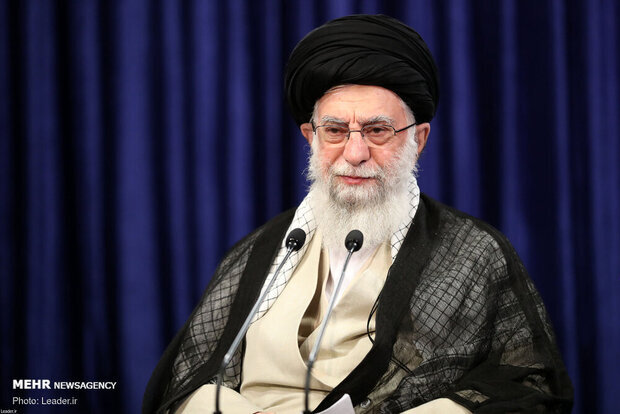Leader denounces Charlie Hebdo for insulting Islam, Muslims

TEHRAN — Leader of the Islamic Revolution Ayatollah Ali Khamenei has condemned the republication of cartoons insulting the Holy Prophet of Islam (PBUH) by the French satirical magazine Charlie Hebdo, saying the move once again exposed the enmity of the political, cultural centers of the Western world toward Islam.
“The unforgivable sin of a French magazine in insulting the Holy Prophet (PBUH) once against exposed the enmity and the vile spite of the political and cultural centers of the Western world toward Islam and the Muslim community,” Ayatollah Khamenei said in a message on Tuesday.
He said freedom of expression is misused by some French politicians to not condemn such great crime. This is “completely wrong and demagogic,” the Leader noted.
The deep anti-Islamic policies of the Zionists and arrogant governments are the cause of such hostile moves, said Ayatollah Khamenei.
“This move at this time could also be a measure to distract the nations and governments of West Asia from the sinister plots of the United States and the Zionist regime for the region.”
“Muslim nations, especially West Asian nations, should maintain vigilance regarding the issues of this sensitive region and never forget the hostility of Western politicians and rulers towards Islam and Muslims,” the Leader concluded.
In a reckless, provocative move, the French satirical magazine Charlie Hebdo on September 2 republished the same cartoons about Prophet Muhammad (PBUH) that prompted a deadly attack on the magazine in 2015.
The cartoons were republished so as to mark the start of the terrorism trial of people accused as accomplices in the attack. The magazine posted the cartoons online on September 1 and they appeared in print the next day.
13 men and a woman accused of providing the attackers with weapons and logistics went on trial on charges of terrorism.
Twelve people, including some of France’s most famous cartoonists, were killed on January 7, 2015, when two French-born brothers of Algerian descent, Said and Cherif Kouachi, went on a gun rampage at Charlie Hebdo’s offices in Paris.
The brothers identified themselves as belonging to the terrorist group al-Qaeda and cited “avenging the prophet” as their reason for the attack. The attack touched off a wave of killings claimed by Daesh (ISIS) terrorist group across Europe.
On January 9, 2015, Said and Cherif’s friend, Amedy Coulibaly, took hostages and killed four people at a kosher supermarket in Paris. Coulibaly and the Kouachi brothers, who were in contact during the attack, were killed in standoffs with the police.
10 months later, in November 2015, a group of Daesh gunmen and suicide bombers killed 130 people and injured more than 400 at multiple sites across Paris, which became the deadliest of the attacks.
Throughout the world, many Muslims see the publication of the cartoons as a renewed provocation by Charlie Hebdo, which has a history of publishing material considered racist and anti-Muslim.
Tehran on September 3 strongly condemned the French magazine, saying any insult against the prophet of Islam and other divine prophets is not acceptable at all.
“The French magazine’s offensive move, which has been repeated on the pretext of freedom of speech, has hurt the feelings of the world’s monotheists, is a provocative move and an insult to the Islamic values and beliefs of over one billion Muslims in the world,” Foreign Ministry spokesman Saeed Khatibzadeh said in a statement.
Khatibzadeh defended freedom of speech but also suggested that the issue regarding the Charlie Hebdo controversy is not about free speech but it’s about an attack against the “peaceful coexistence of human beings”.
“Unlike the offensive move made by the magazine, freedom of speech is a great value which must be used in a constructive way in line with the peaceful coexistence of human beings and further understanding among religions,” the spokesman said, according to the Foreign Ministry website.
MH/
Leave a Comment